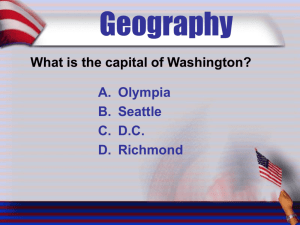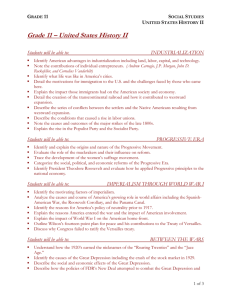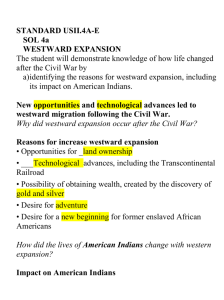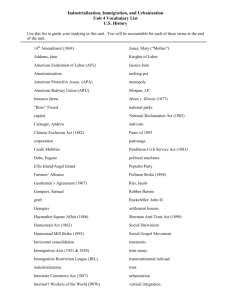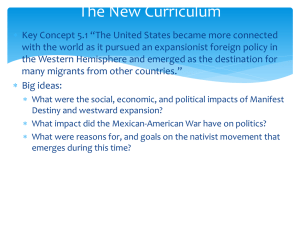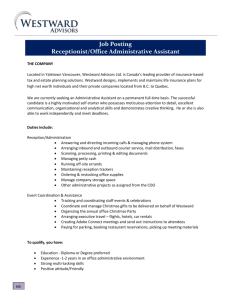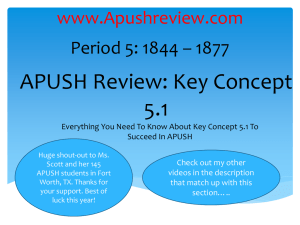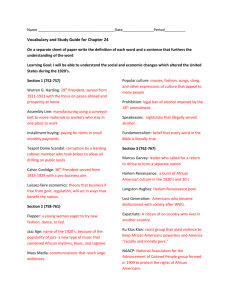Patriotic - Dozier Middle School
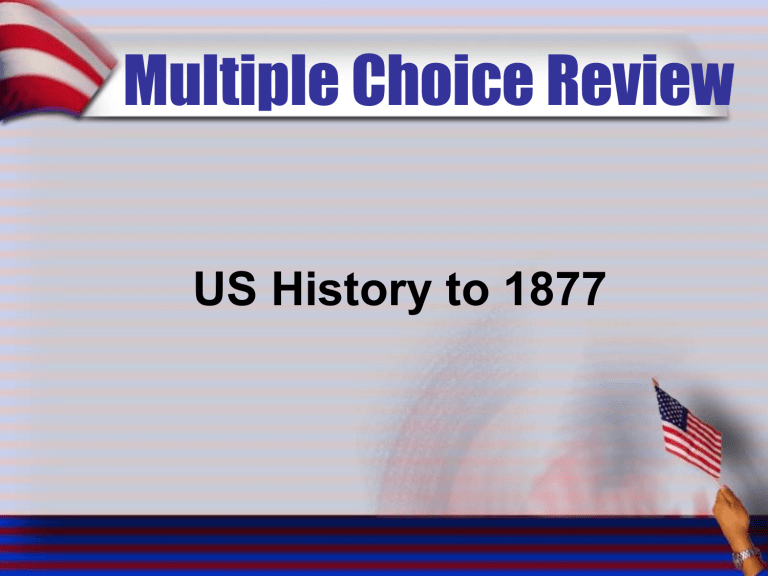
Multiple Choice Review
US History to 1877
Geography
What is the capital of Washington?
A. Olympia
B. Seattle
C. D.C.
D. Richmond
Geography
Which capital belongs to the noncontiguous region?
A. Sacramento
B. Tallahassee
C. Honolulu
D. Richmond
Geography
Which group of famous cities would you find in the Northeastern part of the
United States?
A. San Francisco, Los Angeles, Seattle
B. Chicago, St. Louis, Detroit
C. New York, Boston, Pittsburgh
D. Atlanta, Washington D.C., New Orleans
Geography
What United States city is known for their steel plants?
A. Pittsburgh
B. Detroit
C. Chicago
D. Philadelphia
Geography
If you were an African American in the
1920’s, where would you live in order to have a better standard of living?
A. Montgomery, Alabama
B. Nashville, Tennessee
C. Boston, Massachusetts
D. Atlanta, Georgia
Geography
The textile industry in the United
States is associated with what area?
A. New England
B. Pacific Region
C. Detroit
D. Los Angeles
Geography
What states are located in the southwest region of the United States?
A. Maine, Vermont, New Hampshire
B. Texas, Oklahoma, New Mexico
C. Alaska, California, Hawaii
D. Maryland, Delaware, Virginia
Geography
Which group of cities is located in the southwestern region of the United
States?
A. Honolulu, Juneau
B. Atlanta, New Orleans
C. San Antonio, Santa Fe
D. Boston, Philadelphia
Westward Expansion
Chief Joseph led the Nez Perce Indians toward Canada, but finally decided he must -
A. Enjoy life on a reservation
B. Surrender to the army
C. Live in Mexico
D. Continue to fight
Westward Expansion
What led to the collapse of the cattle drives in the west?
A. There was no way to get the cattle to the east.
B. There were too many cattle for the open range.
C. The creation of the transcontinental railroad.
D. Sheep ranchers took over the open range.
Westward Movement
After the Civil War, what two valuable minerals were discovered in the West?
A. coal and silver
B. copper and coal
C. gold and coal
D. silver and gold
Westward Expansion
What was the result of prospectors moving to new mining sites?
A. Homesteads
B. Boom towns
C. Indian reservations
D. Ghost towns
Westward Expansion
How did the invention of barbed wire and the steel plow influence the westward movement?
A. It allowed people to move to more challenging environments.
B. It improved tobacco farming in
Virginia.
C. It improved railroad construction.
D. It allowed farmers to plant more crops.
Westward Expansion
Due to low rainfall on the Great Plains, farmers adapted their techniques by using which of the following?
A. Sod homes
B. Dry farming
C. Railroads
D. Barbed wire
Westward Expansion
What form of shelter did settlers use because of the scarcity of trees on the
Great Plains?
A. Teepee
B. Grass hut
C. Log cabin
D. Sod house
Westward Expansion
What new invention allowed wheat farmers to harvest their crops more quickly?
A. Steel plow
B. Windmill
C. Barbed wire
D. Railroads
Westward Expansion
Which best describes the features and climate of the Great Plains?
A. Flatlands that rise gradually from east to west.
B. Land eroded by dust storms and water
C. Low rainfall
D. All of the above
Westward Expansion
What reason caused people to expand westward?
A. Opportunities for land ownership
B. Transcontinental railroad
C. Gold and silver
D. All of the above
Westward Expansion
What physical feature of the Great
Plains made the land ideal for raising cattle?
A. Abundant trees
B. Flat open prairie
C. Large rivers
D. Rolling hills
Westward Expansion
What motivated the government policy of forcing all Native Americans onto reservations?
A. A desire to protect their way of life
B. To give them voting rights
C. To get more land for settlers
D. To punish settlers for stealing land
Westward Expansion
The idea of Manifest Destiny meant what?
A. Native Americans had an equal claim to the lands in the west.
B. Slavery should be allowed in the west.
C. No more European colonies would be allowed in America.
D. The United States had the right to expand to the Pacific Ocean.
Westward Expansion
Crazy Horse and Sitting Bull played a part in the _____?
A. Battle of Little Big Horn
B. Civil War
C. Sand Creek Massacre
D. Spanish American War
Westward Expansion
The completion of the Transcontinental
Railroad in 1869 contributed to the settlement of what region of the United
States?
A. Northeast
B. Southeast
C. Western Rocky Mountains
D. Non-contiguous
Westward Expansion
What was the impact of the westward movement on the Native Americans?
A. Reservations
B. Gold
C. Homestead Act
D. Civil War
Westward Expansion
Buffalo in the west were on the verge
Of _____?
A. Being domesticated
B. Extermination
C. Set aside for Indians
D. All of the above
Westward Expansion
Which of the following was a provision of the Homestead Act?
A. Gold
B. Transcontinental Railroad
C. 160 acres of land
D. Cattle drives
Westward Expansion
Which of the following men fought in the Battle of Little Big Horn?
A. George Custer
B. Teddy Roosevelt
C. Chief Joseph
D. Abraham Lincoln
Westward Expansion
The Transcontinental Railroad helped to link the following?
A. Arctic Ocean to the Indian Ocean
B. Atlantic Ocean to the Pacific Ocean
C. Indian Ocean to the Pacific Ocean
D. Atlantic Ocean to the Indian Ocean
Westward Expansion
An Indian reservation is?
A. Hunting ground for all Americans
B. A national park for Indians
C. Land set aside for Indians
D. Land set aside for buffalo
Westward Expansion
The Homestead Act of 1862 helped the development of the West by?
A. Granting land for the construction of the transcontinental railroad
B. Allowing slavery to spread through the territories
C. Providing free land to settlers
D. Placing Native Americans on reservations
Immigration
Immigrants came to the United states from many parts of the world. Which group traveled the shortest distance to get to the
United States?
A. Chinese
B. Canadians
C. Irish
D. German
Immigration
In the late 1800’s, the increase for tenement building was a direct result of ____?
A. Changing roles for women during war
B. Rapid growth of cities due to immigrants
C. Westward expansion by Americans
D. Young children working in factories
Immigration
Which of the following BEST describes a tenement?
A. Cramped quarters on a ship
B. Place to go for food and shelter
C. A run-down apartment building
D. A suburb of the city
Immigration
Hull House, a famous settlement house in Chicago, was founded by which of the following?
A. Jane Addams
B. Susan B. Anthony
C. Bessie Smith
D. Eleanor Roosevelt
Immigration
During the 1800’s/ early 1900’s, working conditions were _____?
A. Good, with an 8-hour day, good wages, and safe conditions.
B. Okay, with high wages, and fairly safe conditions.
C. Poor, with long hours, low wages, and unsafe conditions.
D. Poor, with short hours, low wages, and safe conditions.
Immigration
Where did most of the post Civil War immigrants come from?
A. Eastern China
B. South Africa
C. Western Asia
D. Eastern Europe
Immigration
The Chinese Exclusion Act of 1882 prevented Chinese from?
A. Leaving Ellis Island
B. Immigrating to America
C. Leaving America
D. Emigrating from China
A. New York Island
B. Great Hall Island
C. Ellis Island
D. Angel Island
Immigration
This is a picture of what island located off the coast of New York?
Immigration
This picture most likely represents what?
A. Westward expansion
B. Emigration
C. Labor Union
D. Homestead strike
Immigration
America’s first attempt to limit the number of immigrants entering the United States began in 1882 with the inception of?
A. Restriction on Russian immigrants
B. The Chinese Exclusion Act
C. The Japanese Exclusion Act
D. Standard Quota for formula system
Immigration
What product was most responsible for the growth of the major industrial area in Detroit, Michigan?
A. Oil industry
B. Textile industry
C. Automobile industry
D. Steel industry
Immigration
After the Civil War, what city became the center of the meat packing industry?
A. Sacramento
B. Kansas City
C. Pittsburgh
D. Chicago
Immigration
Which of the following is NOT a reason immigrants came to the United States following the Civil War?
A. For a new adventure
B. To begin an oppressive government
C. Hope for a better opportunity
D. Religious freedom
Immigration
Alexander Graham Bell invented the -
A. Cotton gin
B. Telephone
C. Light bulb
D. Steam boat
Immigration
Which is the correct combination?
A. Cotton gin - Carnegie
B. Telephone - Rockefeller
C. Lighting and Electricity - Edison
D. Railroads - Bell
Immigration
What modern technology can trace its origin to an invention of Alexander
Graham Bell?
A. Airplane
B. Cell phone
C. Microwave
D. Nuclear power
Industrialization
Which was NOT a result of affordable automobiles?
A. Growth of cities
B. Greater mobility
C. Creation of jobs
D. Suburban developments
Industrialization
Which statement is evidence that labor unions were more powerful after World War II?
A. More workers were injured in factory accidents.
B. Workers worked more hours for less money.
C. Fewer workers wanted to join the union.
D. Workers got new benefits and higher salaries.
Industrialization
Andrew Carnegie is most associated with -
A. Railroads
B. Steel
C. Mining
D. Oil
Industrialization
John D. Rockefeller formed a monopoly in -
A. Steel
B. Railroads
C. Oil
D. Cattle
Industrialization
All of the following are matched correctly EXCEPT?
A. John D. Rockefeller – oil
B. Andrew Carnegie – steel
C. Henry Ford – automobile
D. David Sarnoff - railroads
Industrialization
The assembly line increased?
A. The need for skilled workers
B. The quality of products while increasing costs
C. The quantity of products while decreasing costs
D. Worker safety on the job
Industrialization
As a result of new technologies in the
1920’s, Americans had -
A. More chores to complete
B. Extra leisure time
C. Less time to play sports
D. An increase income
Industrialization
Labor unions formed to help workers -
A. Work longer hours for lower pay
B. Child labor laws
C. Encourage the use of more child labor
D. Stop government interference in the workplace
Industrialization
When labor union workers protested low pay or working conditions, they used -
A. Monopolies
B. Child labor laws
C. Strikes
D. Trusts
Industrialization
The Homestead Strike of 1892 involved-
A. Standard Oil employees
B. Workers from McCormick
C.
Carnegie’s steel workers
D.
Pullman’s railway employees
Industrialization
Which of the following workers could have been a member of the American
Federation of Labor?
A. Factory worker
B. Farmer
C. Slave
D. Doctor
Industrialization
One of the most important improvements in transportation in the early twentieth century was the -
A. Railroad
B. Automobile
C. Ships
D. Steam engine
Industrialization
Which of the following was most responsible for the decrease in the use of railroads for transporting goods?
A. Internet
B. Satellites
C. Interstate highways
D. telecommunications
Industrialization
John needs to research information about diabetes. Which modern technology would be the most useful?
A. Cell phone
B. Pager
C. Telegraph
D. Internet
Industrialization
Which of the following was accomplished by the space program in
1970?
A. Put a man on the moon
B. Create a city on the moon
C. Travel to the sun
D. Put a man on Mars
Reform Movements
What corrupt organizations controlled local government in many cities during the Progressive Era?
A. Muckrakers
B. Progressives
C. Political machines
D. Suffragists
Progressive Era
What is Jane Addams mainly known for?
A. The creation of the American Federation of
Labor
B. The work of Hull House
C.
Her work in the women’s suffrage movement
D. Writing a history of the Standard Oil
Company
Industrialization
Why did Henry Ford use the assembly line?
A. To increase the number of cars and decrease the price
B. To decrease the number of cars and increase the price
C. To create a wider variety of cars
D. To pay his employees less
Industrialization
The creation of stocks, corporations, and trusts are most closely connected with -
A. Rise of big business
B. Development of the factory system
C. Formation of labor unions
D. Invention of the automobile
Industrialization
Who used the assembly line in the automobile industry?
A. John D. Rockefeller
B. Andrew Carnegie
C. Henry Ford
D. J.P. Morgan
Industrialization
Guglielmo Marconi was the first to sent messages using -
A. Radio waves
B. Telegraph
C. Telephone
D. Television
Progressive Era
Which is the best summary of the aims of the Progressive Movement?
A.
Cleaning up the world’s cities
B. Eliminating abuses like crime and alcohol
C. Helping new immigrants find homes
D. Solving the problems created by
Industrialization
Wars
In which war was Teddy Roosevelt a military leader?
A. Civil War
B. World War I
C. Cold War
D. Spanish-American War
Spanish American War
Which event was the most important factor in determining American involvement to the
Spanish-American War?
A. Blowing up of the USS Maine
B. Assassination of Archduke Ferdinand
C. Creation of the Rough Riders
D. Sinking of the Lusitania
Spanish American War
Which of the following did NOT become a territory of the United States after the
Spanish-American War?
A. Guam
B. Philippines
C. Cuba
D. Puerto Rico
Spanish American War
From what country did Cuba want their independence?
A. United States
B. Spain
C. Puerto Rico
D. Great Britain
Spanish American War
Which of the following BEST describes the United States after the Spanish
American War?
A. Dominant nation
B. Emerging world power
C. Economically dependent
D. Politically independent
Spanish American War
The United States gained which of the following territories as a result of the
Spanish-American War?
A. Puerto Rico, Cuba, Guam
B. Guam, Philippines, Cuba
C. Cuba, Puerto Rico, Philippines
D. Puerto Rico, Guam, Philippines
Spanish American War
Exaggerated news reports of events is an example of -
A. Yellow Journalism
B. Tabloid Journalism
C. Muckraker Journalism
D. Biased Journalism
Spanish American War
The main goal of yellow journalism is
To -
A. Create revolutions
B. Sell more newspapers
C. Tell the truth
D. Win support for a particular individual
World War I
Which of the events was a major reason the United States became involved in
World War I?
A. League of Nations
B. Sinking of the Lusitania
C. Archduke assassination
D. XYZ telegram
World War I
The United States and its allies fought the Central Powers in World War I. The
Allies included -
A. Austria-Hungary and Turkey
B. Britain and France
C. Germany and Belgium
D. Spain and Ottoman Empire
World War I
Which result of World War I became a cause of World War II?
A. The Versailles Treaty being unfair
B. The League of Nations was a success
C. France was divided into two countries
D. United States became isolationist
World War I
Which of the following is an accurate statement about the League of Nations?
A. The United States does not join the
League of Nations
B. World peace is acquired
C. Germany declares war over the League of Nations
D. The League of Nations still exists today
World War I
What was a result of the Versailles
Treaty?
A. World War II
B. Assassination of Archduke
C. Germany experiences economic success
D. Sinking of the USS Maine
World War I
Which major nation was also allied with
Britain and France through most of
World War I?
A. Russia
B. Spain
C. Germany
D. Sweden
World War I
Many Americans opposed joining the League of Nations because they believed that -
A. Dues the United States would have to pay would be too costly.
B. The League of Nations would not follow a democratic policy.
C. The League of Nations would allow
Germany to join.
D. This would cause the United States to become involved in another European War.
World War I
Why did the Germans torpedo the Lusitania?
A. They wanted to kill innocent Americans.
B. They were upset that they had lost the war.
C. The ship was secretly sending weapons to Great Britain.
D. It was a mistake by the U-boat captain.
World War I
Why was it necessary for soldiers in
World War I to wear protective masks?
A. Machine gun fire
B. Flame throwers
C. Mustard Gas
D. Bayonet
1920’s and 1930’s
During the 1920’s and 1930’s, Aaron
Copeland, George Gershwin, and Duke
Ellington were all associated with -
A. Literature
B. Music
C. Art
D. Politics
1920’s
Which invention helped speed up production in the automobile industry?
A. Mail order retailing
B. Assembly line
C. Hydroelectric plant
D. Wireless communication
1920’s
The growth of organized crime was a direct consequence of -
A. Increased immigration
B. Prohibition
C. Jazz Age
D. Civil Rights Movement
1920’s
Aaron Copland was responsible for -
A. Writing jazz music
B. Turning his back on American traditions
C. Creating classical compositions
D. Writing folk songs
Reform Movements
Home appliances allowed women to?
A. Serve in the military
B. Work outside of the home
C. Have larger families
D. Have less leisure time
1920’s
The Harlem Renaissance was a -
A. Fair in New York
B. Celebration of African American art and literature
C. Nightclub for African Americans
D. Earned African Americans the right to vote
1920’s
Which of the following aviators flew the worlds first plane?
A. Charles Lindbergh
B. Wright Brothers
C. Amelia Earhart
D. Babe Ruth
Reform Movements
Bootleggers -
A. Smuggled illegal alcohol
B. Supported the Temperance Movement
C. Followed the 18 th Amendment
D. Raided and closed speakeasies
1920’s
All of the following are correctly paired
EXCEPT?
A. Langston Hughes - artist
B. Bessie Smith - blues singer
C.
Georgia O’Keefe - poet
D. Duke Ellington - jazz musician
1920’s
Which of the following is associated with movies?
A. David Sarnoff
B. Guglielmo Marconi
C. Charlie Chaplin
D. Eleanor Roosevelt
1920’s
Which of the following is NOT a labor saving device?
A. Washing machine
B. Electric lighting
C. Radio
D. Electric stove
1920’s
The artist who taught about the Great
Migration North through their paintings was -
A. Langston Hughes
B.
Georgia O’Keeffe
C. Jacob Lawrence
D. Booker T. Washington
Reform Movements
Which of the following is true about the
Progressive Movement in the workplace?
A. Improved safety conditions
B. Increased working hours
C. Decreased workers pay
D. Increased child labor
Reform Movements
In what way did the 18 th Amendment affect Americans?
A. Women were granted the right to vote
B. Firearms were banned in public places
C. The sale of alcohol was banned
D. Congress could collect income taxes
Reform Movements
The Temperance Movement eventually -
A. Increased the crime rate
B. Granted women the right to vote
C. Declared speakeasies legal
D. Helped people become less angry
1920’s
Duke Ellington and Louis Armstrong contributed to the development of what musical movement?
A. Classical
B. Jazz
C. Blues
D. Country
Reform Movements
All of the following resulted from prohibition EXCEPT?
A. Speakeasies
B. Bootlegging
C. c. Boomtowns
D. Organized Crime
Reform Movements
What movement wanted to amend the
Constitution to grant women the right to vote?
A. Prohibition
B.
Women’s Suffrage
C. Temperance Movement
D. Jim Crow Movement
Reform Movements
Which of the following supports how Susan B.
Anthony felt about women’s rights?
A. Women should be paid less than men
B. Women should have the right to vote
C. Women should not go to college
D. Women should NOT have the right to vote
Reform Movements
All of the following are reasons for the Great
Migration North EXCEPT?
A. Jobs for African Americans were scarce in the South
B. African Americans were facing discrimination in the South
C. African Americans were searching for jobs in the North
D. There was no discrimination in the North
1920’s
Writers of the Harlem Renaissance were concerned with the -
A.
Fashions of the 1920’s
B. Cultural experiences of African
Americans
C. Effects of prohibition on Americans
D. Long term effects of World War I
Reform Movements
The Temperance Movement was an attempt to alter immoral actions by -
A. Providing women the opportunity to vote
B. Banning the consumption of alcohol
C. Outlawing the use of child labor
D. Providing tax relief for immigrants
1920’s
The Great Migration North is defined as -
A. African American writers, musicians, and artists gaining popularity
B. People moving from the cities to the suburbs
C. Mexicans immigrating to the United
States
D. African Americans moved to the northern cities in search of better jobs
Great Depression
Which writer described the life of migrant workers during the Great
Depression?
A. John Steinbeck
B. Ernest Hemingway
C. F. Scott Fitzgerald
D. Langston Hughes
Great Depression
Which was a major feature of the New
Deal?
A. Social Security program
B. Head Start program
C. Homestead Act
D. Pure Food and Drug Act
Great Depression
Which President is associated with the
New Deal?
A. Herbert Hoover
B. Harry Truman
C. Teddy Roosevelt
D. Franklin Roosevelt
Great Depression
All of the following were impacts of the
Great Depression EXCEPT ?
A. Consumers had to wait in line for food
B. The price of farm goods fell
C. Investments in business became worthless
D.
Farmer’s income rose to higher levels
Great Depression
In what decade did the stock market crash?
A.
1910’s
B.
1920’s
C.
1940’s
D.
1950’s
Great Depression
The Social Security Act -
A. Gave benefits to elderly Americans
B. Is no longer in use today
C. Provided free meals to the homeless
D. Employed thousands of Americans
Great Depression
All of the following were causes of the
Great Depression EXCEPT?
A. Over speculation on stocks
B. Failure of the Federal Reserve to prevent the banks from collapsing
C. High tariffs strangled international trade
D. Business created job assistance programs
Economics
The Stock Market Crash is considered to be the beginning of -
A. The Roaring Twenties
B. The Great Depression
C. The New Deal
D. World War II
Great Depression
During the height of the Great
Depression, one in _____ workers was unemployed?
A. 2
B. 4
C. 6
D. 8
Great Depression
All of the following were major features of the New Deal EXCEPT ?
A. Environmental improvement plans
B. Retirement plans for the elderly
C. Farm assistance programs
D. More taxes on the poor
World War II
Anti-Semitism is associated with -
A. Discrimination of Jews
B. Discrimination of African Americans
C. Discrimination of Italians
D. Discrimination of Germans
World War II
What example of propaganda got women to go to work in factories?
A. Susan the Warrior
B. Rosie the Riveter
C. Truman the Conqueror
D. Hitler the Anti-Semitic
World War II
The phrase “Baby Boom” refers to what event?
A. An increase in births during World War II
B. A large number of very young soldiers in the
Army
C. An increase in births from the end of WWII through the 1950’s
D. An increase in the number of school children in the early 1930’s
Reform Movements
In which time period did women outnumber men working in factories?
A. Before World War II
B. During World War II
C. After World War II
D. After World War I
World War II
Of the following events, which occurred LAST ?
A. V-E Day (Victory over Europe)
B. Germany invades Belgium
C. D-Day Invasion
D. V-J Day (Victory over Japan)
World War II
The first place occupied by Hitler during World War II was -
A. France
B. Great Britain
C. Spain
D. Poland
World War II
What ended United States isolationism and brought the nation into World
War II?
A. German U-boat attacks
B. The attack on Pearl Harbor
C. Beginning of Lend-Lease
D. The Non-Aggression Pact
World War II
Which of the following nations was partially occupied by German troops?
A. Great Britain
B. United States
C. France
D. Poland
World War II
President Truman dropped the atomic bombs to -
A. Avoid huge United States casualties
B. Prolong the war
C. Punish the Japanese
D. Reduce civilian deaths
World War II
What was Hitler’s “final solution”?
A. A policy requiring Jews to live in ghettos
B. The expulsion of Jews to
Palestine
C. The policy of killing all Jews
D. The trial of Nazi leaders
World War II
Which event comes immediately before the United States entered World War II?
A. Bombing of Pearl Harbor
B. Battle of Midway
C. D-Day
D. Germany invades Poland
Reform Movements
Whose rights did Eleanor Roosevelt help expand?
A. Women of all colors
B. European-American men
C. Congress
D. Doctors
World War II
Which leader is correctly matched to the correct form of government?
A. Fascism - Hitler
B. Communist - Roosevelt
C. Democratic - Tojo Hideki
D. Anarchism - Mussolini
World War II
On D-Day the Allies -
A. Dropped the atomic bomb on Hiroshima
B. Landed on the beaches of
France
C. Invaded Italy
D. Defeated Hitler
World War II
Which battle was the turning point for the United States in the Pacific War?
A. Pearl Harbor
B. Coral Sea
C. Midway
D. Guam
World War II
Which of the following events is associated with the beginning of World
War II?
A. Bombing of Pearl Harbor
B. Germany invading Poland
C. Sinking of the Lusitania
D. Invasion of Normandy
World War II
Which group of Americans were forced to move into internment camps?
A. Japanese-Americans
B. Chinese-Americans
C. German-Americans
D. Italian-Americans
World War II
The famous Non-Aggression Pact was signed between -
A. Stalin and Hitler
B. Roosevelt and Stalin
C. Tojo and Stalin
D. Stalin and Churchill
World War II
When did World War II begin?
A. August 1, 1915
B. June 6, 1944
C. September 1, 1939
D. October 29, 1929
World War II
Which is NOT a member of the Allies in
World War II?
A. France
B. Soviet Union
C. Italy
D. Great Britain
World War II
Which of the following is not something Hitler gained during appeasement?
A. Austria
B. Poland
C. Sudetenland
D. Czechoslovakia
World War II
Which country was led by Adolph Hitler?
A. Soviet Union
B. Great Britain
C. Italy
D. Germany
World War II
Following World War II, women -
A. Remained in the workforce
B. Gained equal pay with men
C. Returned to family responsibilities
D. Gained corporate leadership
World War II
Which country was led by Benito
Mussolini?
A. Soviet Union
B. Great Britain
C. Italy
D. Germany
World War II
Which leader is NOT correctly matched to the correct country?
A. Truman – United States
B. Roosevelt – United States
C. Churchill – France
D. Stalin – Soviet Union
World War II
Which of the following was leader of
ONE of the three axis Powers during
World War II?
A. Benito Mussolini
B. Winston Churchill
C. William King
D. Josef Stalin
World War II
What was the Holocaust?
A. A plan to build enough nuclear weapons to wipe out the human race
B. A policy of using Jewish slave labor in Germany’s wartime work camps
C.
An attempt to break an opponent’s will to fight by heavily bombing his cities
D. An attempt to kill all European Jews
World War II
In the United States, which of the following were the victims of the most serious discrimination during World War II?
A. African Americans
B. German Americans
C. Japanese Americans
D. Italian Americans
World War II
Identify the country the United States supplied arms under the Lend-Lease
Act?
A. Germany
B. Great Britain
C. Japan
D. Spain
World War II
Which was the most likely destination for a German-Jewish woman during
World War II?
A. Internment Camp
B. Concentration Camp
C. United States
D. Soviet Union
World War II
What type of government did Japan adopt following World War II?
A. Communist
B. Fascist
C. Socialist
D. Democratic
World War II
All of the following are a result of the bombing of Pearl Harbor EXCEPT ?
A. United States declares war on Japan
B. The United States Navy was destroyed
C. The United States dropped an atomic bomb on Japan
D. Japan bombs the Lusitania
World War II
Which of the following governments give total power to a dictator?
A. Democracy
B. Fascism
C. Communism
D. Socialism
Cold War
After World War II, Germany was -
A. Partitioned into East and West Germany
B. Forced to pay reparations for World War II damages
C. An American Territory
D. Under total Communist domination
World War II
How did Americans at home help the war effort in World War II?
A. By rationing resources
B. By fighting in Europe
C. By hoarding food
D. Going on as if nothing had happened
World War II
In 1945, which of the following was established to prevent future global wars?
A. Berlin Wall
B. Manhattan Project
C. United Nations
D. European Union
Cold War
The main reason the United States chose to rebuild Europe after World
War II was to -
A. Prevent immigration to America
B. Help the Soviet Union
C. Prevent more political instability
D. Punish the Allied Powers
Cold War
After World War II, the United States helped rebuild Europe using the -
A. Truman doctrine
B. Marshall Plan
C. United Nations
D. Nuremberg Trials
Cold War
After World War II, the United States -
A. Returned to a policy of isolationism
B. Helped to rebuild Europe
C. Insisted on punishing Japan
D. Turned Germany over to the
Soviet Union
Cold War
The United Nations differs from the
League of Nations because it -
A. Is an international organization
B. Has the United States as a member
C. Tries to prevent future global wars
D. Is a peacekeeping organization
Cold War
What event is associated with the collapse of Communism?
A. Division of Korea
B. Vietnam War cease-fire
C. Destruction of the Berlin Wall
D. Creation of the Warsaw Pact
Cold War
The Berlin Airlift allowed -
A.
Berlin’s inhabitants to escape
B. The Allies to supply Berlin
C. The Soviets to build a wall around Berlin
D. The West to attack the Soviet Union
Cold War
Which country was separated by the
Iron Curtain?
A. Poland
B. France
C. Germany
D. Italy
Cold War
During the Cold War, the United States policy of containment was to limit the spread of -
A. Democracy
B. Fascism
C. Communism
D. Socialism
Cold War
Which event spurred on the development of the United States space program?
A. Achievement of Charles Lindbergh
B. The computerization of banking
C. Development of nuclear power
D. Soviet launching of Sputnik
Cold War
Which of the following occurred during the Cuban Missile Crisis?
A. Soviet Union placed missiles in Cuba
B. North Vietnam placed missiles in Cuba
C. United States placed missiles in Cuba
D. Great Britain placed missiles in Cuba
Cold War
The term Cold War means -
A. Tension between the United States and the
USSR
B. Combat between the United States and the
USSR
C. Combat in the Arctic and Antarctic Regions
D. Tension between England and the
United States
Cold War
What is the United Nations?
A. A group of nations that try to prevent future global wars
B. Nations of North and South America who use the same currency
C. Nations who unite to trade with each other
D. A group of European nations that promote tourism
Cold War
What is the name given to a failed attempt, which the United States supported, to take over Cuba?
A. Iran-Contra Affair
B. The Bay of Pigs
C. The Cuban Missile Crisis
D. The Grenada War
Cold War
The Cold War ended with the-
A. Destruction on the North Atlantic
Treaty Organization
B. Break up of the Soviet Union into independent countries
C. Return of the United States to an isolationist country
D. Spread of communism into Europe and Asia
Cold War
During the Cuban Missile Crisis, the United
States responded to Soviet missiles in Cuba by -
A. Invading Cuba
B. Attacking the Soviet Union
C. Imposing a blockade around Cuba
D. Negotiating a treaty with the Soviet
Union
Cold War
East and West Germany were reunited by -
A. Cuban Missile Crisis
B. Bay of Pigs
C. Communism spread to West Germany
D. Destruction of the Berlin Wall
Cold War
The “Domino Theory” predicted -
A. The Berlin Wall would fall
B. Communism would spread
C. Soviets would build missiles
D. Democracy would spread
Cold War
All of the following are major conflicts during the Cold War EXCEPT?
A. Korean War
B. Vietnam War
C. Cuban Missile Crisis
D. Destruction of the Berlin Wall
Vietnam
The United States went to war in
Vietnam in order to stop the spread of -
A. Fascism
B. Communism
C. Socialism
D. Federalism
Vietnam
United States involvement in the
Vietnam War ended in a -
A. South Vietnamese victory
B. Cease-fire agreement
C. North Vietnamese victory
D. United States victory
Korean War
Which statement best describes the outcome of the Korean Conflict?
A. North Korea won
B. South Korea won
C. The conflict ended in a stalemate
D. The conflict reunited Korea
Civil Rights Movement
Which leader most influenced African
Americans to stand up against discrimination and demand equality?
A. Booker T. Washington
B. John W. Brown
C. Plessy V. Ferguson
D. W.E.B. DuBois
Civil Rights Movement
How did Booker T. Washington’s ideas differ from W.E.B. DuBois?
A. Washington wanted African Americans to demand equal rights.
B. Washington only wanted equal voting rights for African Americans.
C. Washington was strongly against job education for African Americans.
D. Washington believed equality could be achieved through education.
Civil Rights Movement
“I have a dream that one day, out in the red hills of Georgia, sons of former slaves…will be able to sit down together at the table of brotherhood.”
A.
Dr. King’s message is that slavery should end.
B.
Dr. King’s message is that Americans should dream.
C.
Dr. King’s message is that Racial discrimination must end.
D.
Dr. King’s message is that Racial discrimination will never end.
Civil Rights Movement
If a golf course refused to allow African Americans to play, which action would Martin Luther King Jr. most likely have approved?
A. Burn the golf course down
B. Quit playing golf and take up another sport
C. A sit-in protest at the golf course
D.
Physically attack the golf course’s owner
Civil Rights Movement
The Montgomery bus boycott was a direct result of -
A. Assassination of Martin Luther King Jr.
B. Increase in bus fared in Montgomery
C.
Rosa Park’s refusal to move to the back of the bus
D. Unsafe bus transportation
Civil Rights Movement
Which of the following Supreme Court cases ruled that segregated schools were unequal and unconstitutional?
A. Plessy vs. Ferguson
B. Brown vs. Board of Education
C. Marbury vs. Madison
D. Miranda vs. Arizona
Civil Rights Movement
Which of the following examples BEST describes racial segregation following the Civil War?
A. A woman was arrested for trying to vote at a local election
B. A fifty-year old man was not hired for a job based on his age.
C. An African American was forced to ride in a separate railroad car.
D. A woman working in a factory made less money than a man doing the same job.
Civil Rights Movement
African-Americans were forced to ride in separate railroad cars. This was an example of -
A. Jim Crow Laws
B. Anti-lynching Laws
C. Southern Railroad
Act
D. Homestead Act
Civil Rights Movement
Why did the Civil Rights movement oppose the Plessy v. Ferguson Supreme
Court ruling?
A. The ruling desegregated schools
B. Public facilities were never equal
C.
The ruling supported women’s suffrage
D. The ruling integrated public facilities
Civil Rights Movement
The main purpose of the Jim Crow laws was to -
A. Encourage black and white citizens to help each other
B. Encourage boycotts
C. Encourage the growth of black-owned businesses
D. Encourage the separation of blacks and whites
Civil Rights Movement
What was the main difference in how Booker T.
Washington and W.E.B. DuBois responded to racism?
A.
DuBois supported a Back-to-Africa movement, and
Washington opposed it.
B.
DuBois wanted African Americans to attend blacks-only schools, and Washington wanted to desegregate education.
C.
DuBois wanted to attack racial discrimination head-on, and Washington preferred to ignore it.
D.
Washington thought better education was the path to equality, and DuBois disagreed.
Reform Movements
Which piece of legislation enabled many Americans, who could not have otherwise afforded to do so, to attend college?
A. Education Act of 1964
B. G.I. Bill of Rights
C. Tax Reform Act of 1981
D. Twenty-First Amendment
Reform Movements
When was it no longer surprising to see women working as coal miners, police officers, doctors, television newscasters, and astronauts?
A.
1920’s
B.
1930’s
C.
1970’s
D.
1870’s
Economics
After World War II, how did Americans purchase cars and other costly items they could never before afford?
A. Credit
B. Layaway
C. Barter
D. Trade
Economics
What types of goods were more factories producing after 1945?
A. War materials
B. Consumer products
C. Military uniforms
D. Tanks
Economics
According to the law of supply and demand, farmers would be able to obtain the highest price for their product when -
A. Both supply and demand are high
B. Both supply and demand are low
C. Supply is high and demand is low
D. Supply is low and demand is high
Technology
What impact do the newest technologies have on American life?
A. Increased travel for business and pleasure
B. Greater access to news and information
C. Greater access to heating and airconditioning
D. All of the above
Technology
Which of the following is associated as a newer technology?
A. Internet
B. Space exploration
C. Jets
D. All of the above
Technology
Which industry has benefited most from new communications technologies?
A. Automobiles
B. Entertainment and news
C. Food processing
D. Steel industry
Technology
What has been one result of technological change since 1990?
A. Cheaper and faster forms of communication
B. More cultural differences among the nations of the world
C. More traffic accidents as driving becomes increasingly unsafe
D. Increased likelihood of a nuclear war
